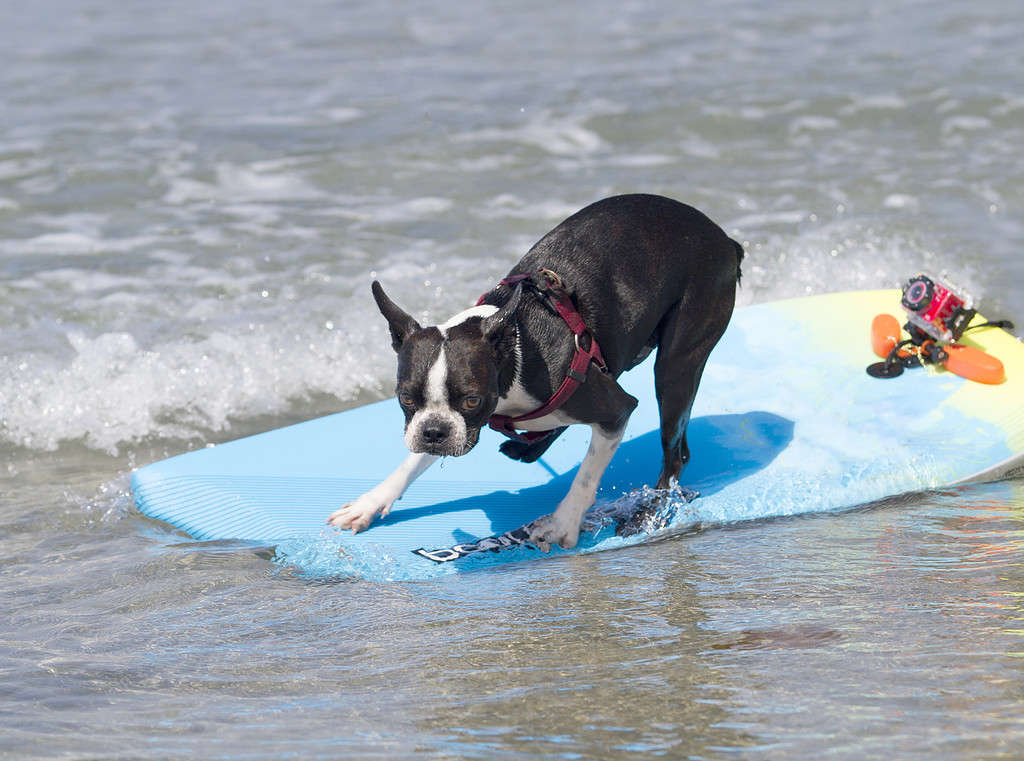Most people fall in love with Boston terriers’ soulful eyes and wiggly backsides, but long-time owners often cite impressive brainpower as this breed’s most winning trait. So, how smart are Boston terriers — and how does their intelligence compare to other breeds? Let’s explore what we know from both research and owner anecdotes.
Exploring the Intelligence of Boston Terriers

Boston terriers have a lot more to offer than just loving eyes and perky ears!
©es.photo/Shutterstock.com
Before we delve into how smart Boston terriers are, let’s first discuss how intelligence is measured in dogs in the first place.
Unfortunately, at least for now, dogs can’t take IQ tests like humans, so measuring their intelligence is more difficult. On top of that, intelligence refers to different traits and abilities in humans and dogs.
With dogs, we distinguish between three types of intelligence:
- Instinctive intelligence refers to a dog’s ability to perform tasks for which its breed was originally bred. While their ancestors were bred for fighting and hunting vermin, Boston terriers were likely bred to provide companionship for the city’s wealthy elites. This means we could measure their instinctive intelligence by how well they fulfill that task.
- Adaptive intelligence relates to a dog’s ability to learn and solve problems on their own, such as How do I get this treat from that top shelf where mom put it?
- Working and obedience intelligence is a dog’s ability to adapt to and obey human commands, such as “sit,” “stay,” or “roll over.”
While we don’t have any hard proof for this, most Boston terrier owners will tell you that their dogs are very good at understanding their emotions. This makes them excellent at performing the task they’re originally bred for, providing companionship. Let’s explore other aspects of their intelligence in more depth.
The Cognitive Capabilities of Boston Terriers: Understanding Their Problem-Solving Skills and Brain Size
The brain of an average Boston terrier will be the size of a tangerine or tennis ball, weighing around 16 grams in total. For reference, the human brain weighs around three pounds and is the size of approximately 10 tennis balls.
However, it’s important to note that we don’t know to what extent brain size influences intelligence. In other words, a smaller brain doesn’t always correlate to poor cognitive abilities.
Let’s also quickly mention that Boston terriers have a reputation for being apt at solving problems. However, unfortunately, we don’t have any fact-based data to clearly confirm this.
Boston Terriers’ Learning Aptitude: How Quick and Adaptive Are They?

Dog owners report that Boston terriers are quick learners, easily picking up new skills and tackling new challenges.
©TransientEternal/iStock via Getty Images
Adaptive intelligence is most closely related to learning aptitude, i.e., a dog’s ability to quickly adapt to new environments and situations. Unfortunately, we don’t have a lot of hard data that would confirm this either.
However, most owners and dog experts agree that the Boston terrier is quite an adaptive breed. For example, consider what one dog trainer shared on Quora:
“In addition, Boston Terriers are highly adaptable dogs that are able to adjust to new environments and situations. This means that they are able to learn and follow commands in a variety of settings, whether they are at home, in a park, or in a training class.” — Dogtraincourse
We completely agree: Boston terriers are quick learners and can easily tackle most new or never-before-encountered challenges.
Intelligence Ranking: Where Do Boston Terriers Stand Among Other Breeds?
According to Coren’s ranking of dogs by intelligence, Boston terriers fall under the “average” category. More precisely, they are ranked as average at working and obedience intelligence, making it to 54th place out of 79 in total.
But don’t think that this means anything bad. If we refer to Coren’s list, we will see that, despite being ranked as average, Boston terriers are in great company.
- They share their place on the “scoreboard” with Akita and are placed just below the Ibizan hound, Welsh terrier, and Irish terrier.
- They are also just ahead of the Skye terrier, Norfolk terrier, Sealyham terrier, and pug.
Again, Boston terriers occupy the middle position on the list, which means they are still ranked as smarter than many other breeds. Also, there is another thing to consider: Is obedience really a good way to measure intelligence in dogs?
Here is the thing. Despite being people-pleasers, Boston terriers are known for being a bit stubborn, often displaying “selective hearing”. This means they are prone to obeying the commands they want to and disregarding the rest.
For example, here is what one owner shared when asked whether a Boston terrier is an easy dog to have:
“An easy dog to have? A Boston Terrier? Hahahaha! Whew … ok, I’m done with my laughing fit. Now I shall proceed to the answer. (….) An easy face to love … But they’re as stubborn as the day is long. Not easy.” — Diana Weissend
So, the question is — does this stubbornness equate to low intelligence or just a strong personality? We will let you decide.
Unlocking Boston Terriers’s Intelligence Potential: Training Techniques and Mental Stimulation
So, now that you know everything there is to know about the Boston terriers’ intelligence, let’s explore how you can maximize it with the right training.
- Provide positive reinforcement. As mentioned, Boston terriers are people-pleasers. They thrive on positive reinforcement, so make sure to apply it during training. Provide verbal praise, treats, and — of course! — cuddles whenever they successfully follow your commands.
- Start training your pup early. As with any breed, early training can be key in developing and expanding a dog’s intelligence. The sooner you start, the better results you’ll see. You may even soften some of that infamous stubbornness!
- Plan plenty of exercise. Remember, Boston terriers are highly energetic dogs. In order to behave well (i.e., exhibit a higher level of working and obedience intelligence), they need an outlet for all of that energy. So, make sure to provide enough opportunities for them to exercise. If you live in an apartment, you can engage them in a game of tug and fetch or have them chase their favorite ball.
Let’s also not forget that Boston terriers need a lot of mental stimulation. Keep their brains engaged with puzzle toys, treat-dispensing toys, and interactive games. You can also consider rotating their toys to keep things fresh and exciting.
Ready to discover the top 10 cutest dog breeds in the entire world?
How about the fastest dogs, the largest dogs and those that are -- quite frankly -- just the kindest dogs on the planet? Each day, AZ Animals sends out lists just like this to our thousands of email subscribers. And the best part? It's FREE. Join today by entering your email below.
Thank you for reading! Have some feedback for us? Contact the AZ Animals editorial team.








